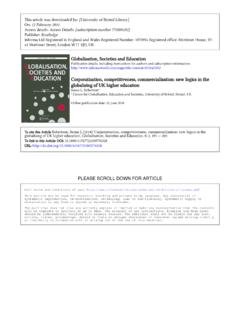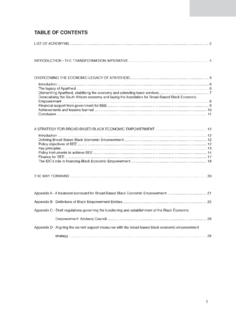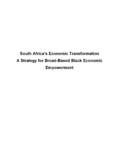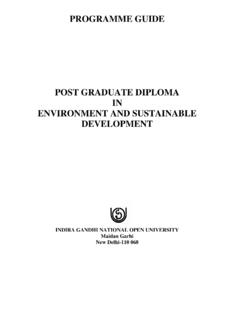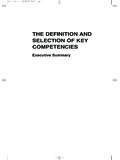Transcription of HIGHER EDUCATION AND SOCIAL …
1 COUNCIL ON HIGHER EDUCATION HIGHER EDUCATION AND SOCIAL transformation south Africa Case Study Report produced by Dr. Thiven Reddy (University of Cape Town) February 2004 Didacta Building, 211 Skinner Street, Pretoria, 0002; PO Box 13354, The Tramshed, 0126; Telephone: +27 12 392 9119; Fax: +27 12 392 9110; E-mail: Visit our website at 2 ACKNOWLEDGEMENTS This commissioned paper by the Council on HIGHER EDUCATION (CHE) would not have been possible without the enormous benefits I received from discussing it with friends and colleagues who attended two workshops of the Role of Universities in the transformation of Societies organised by the Open University, The Association of Commonwealth Universities and the CHE. I thank the staff of the EPU Resource Centre of the University of the Western Cape, particularly Ms Mymoena Adriaanse who provided me with all the materials and information I requested.
2 I also like to thank Dr Neetha Ravjee of the EPU at the University of the Western Cape who carefully read many drafts and helped me throughout the research and writing process. Lastly I like to thank Professor Saleem Badat who not only read many drafts but contributed immensely to the conceptual framing of this study. I thank him for his professionalism, sharing his profound knowledge of HIGHER EDUCATION issues with me and his steady determined guidance and supervision of this project throughout the research process. Without him I could not have completed this study. 3 CONTENTS PAGE PART ONE: THE PRE-1994 APARTHEID PERIOD 1. Introduction 5 HIGHER EDUCATION and SOCIAL transformation 6 2. The HIGHER EDUCATION System Under Racial Oligarchy 8 A Differentiated HIGHER EDUCATION Sector 9 State Re-structuring of Civil Society: White Universities 12 State Re-structuring of Civil Society: The Emergence of the Bush Colleges 15 3.
3 The Political Struggle Against Apartheid: Student Politics 19 Progressive Constituencies and Practices Aligned to the Student Struggle 19 NUSAS and Black Students 21 SASO and Black Consciousness 23 SASO and Bantu EDUCATION : The Student Boycott becomes Commonsense 25 4. The Reform Strategy of the Apartheid State 27 PART TWO: THE POST 1994 PERIOD: THE TRANSITION, HIGHER EDUCATION POLICY AND IMPACT 5. Understanding the south African Democratic Transition: Transplacement 28 6. The Macro-Economic Debate: Framing Public Policy Output 31 The Reconstruction and Development Programme: Watered Down Version of Struggle Values and Emergence of GEAR 31 47.
4 HIGHER EDUCATION (HE) After Apartheid 34 National Commission on HIGHER EDUCATION (1996) A Framework for transformation 34 HIGHER EDUCATION White Paper (1997) and Related Policy Documents 37 8. HIGHER EDUCATION and SOCIAL transformation in south Africa: Concluding Remarks 39 BIBLIOGRAPHY 46 APPENDICES Appendix A: Focus of NCHE Research Teams 60 Appendix B: Key HIGHER EDUCATION Policy Documents 61 Appendix C: The NCHE s Framework for Transforming HIGHER EDUCATION 62 Appendix D: Total Headcount Enrolments in EDUCATION (1955) 65 Appendix E: Outputs of Postgraduate by Universities (1986 and 1993) 66 Appendix F: Major Points of the National Plan (March 2001) 67 Appendix G: CHET s Twelve Indicators to evaluate transformation at UPE and PENTECH 69 LIST OF TABLES Table 1: Enrolment of African Students at Selected White Universities (1954-1968) 14 Table 2.
5 Enrolment at Selected Black Universities (1960-1968) 16 Table 3: Ethnic Classification and Student Enrolment at Black Universities 17 Table 4: Staff Profile at Black Universities 18 5 PART 1 THE PRE-APARTHEID PERIOD 1. Introduction This paper advances and draws on the following four propositions. First, in analysing the role of universities in SOCIAL transformation there is a need to draw a distinction between the pre- and post-Apartheid periods; the former focuses on practices of resistance to the Apartheid regime and the latter on constituting a democratic polity in part by addressing Apartheid legacies. The second draws attention to the unintended consequences of National Party policy. It established black universities to produce passive elites to administer ethnic political institutions but created instead terrains that established a vibrant oppositional student movement and other forms of resistance within and related to the HIGHER EDUCATION sector.
6 Third, in the post 1994 period the position of the state towards the role of universities and SOCIAL transformation is derived from a policy inevitably open to reading in two opposing ways. The state demands that universities contribute towards economic and socio-political transformation , yet the nature of the transition from Apartheid to a democratic regime, its macro-economic state policies, and the constraints of globalisation have led to two opposing tendencies. In the first, universities are expected to perform as viable corporate enterprises producing graduates to help steer south Africa into a competitive global economy. In the second, universities are expected to serve the public good and produce critical citizens for a vibrant democratic society.
7 To be sure these two tendencies need not be inherently contradictory, yet they do contain in a country with deep class, race and gender divisions the possibility of pulling in opposite directions. Last, when we consider universities as intrinsic sites of civil society, then the focus on the relationship between the state and civil society can be used to better illuminate some of the problems associated with the role of universities in the post-Apartheid system. While the ANC controlled state actively pursues a transformative agenda, institutions of civil society continue to be sites of ongoing contestation and remain more reticent to change. Universities, like other civil society institutions, if they are not simplistically conceived as monolithic coherent blocs, but as constituted by different constituencies (faculty, departments, students, administrators, workers, etc.)
8 Allows us to see how various sectors could function in contradictory ways - reproducing, eroding, transforming or remaining consciously oblivious to inherited and prevailing SOCIAL relations. The report in summary is organised into three broad sections: The first part includes a descriptive analysis of the main features of HIGHER EDUCATION under white domination, particularly those features of the historically black universities (HBUs) that created the material conditions for the heightened role of student resistance. Particular focus is on student mobilised protest campaigns that helped produce the crisis of Apartheid rule after the mid 1970 s. The second part locates post-Apartheid developments in HIGHER EDUCATION in relation to the nature of the transition and the macro-economic context adopted post-1994.
9 The third section analyses the relations between State policies, university responses to HIGHER EDUCATION reform, and their empirical impact on the economic, political, SOCIAL , and cultural spheres of post-Apartheid society. HIGHER EDUCATION and SOCIAL transformation The role of HIGHER EDUCATION institutions in SOCIAL change during Apartheid is more obvious and clearly visible than its role in the ongoing transformation of contemporary south African society. However the intensely differentiated nature of HIGHER EDUCATION both in the past and present makes it difficult to speak about it as a system having coherence and an undifferentiated identity; hence it is problematic to conceive of a positive empirical relationship between HIGHER EDUCATION and SOCIAL transformation in south Africa. The role of HIGHER EDUCATION institutions in contributing to the collapse of the Apartheid SOCIAL order cannot be answered in an abstract, generalizable or purely causal manner.
10 For example, while many black students, a few progressive academics in some departments, and unionised workers actively participated in the internal resistance movement to bring about the collapse of Apartheid, universities as institutions did not themselves serve as major levers of power against the old order. Instead, these institutions provided the institutional terrain, displaying repressive as well as conducive conditions ( protective spaces ) that facilitated student protest behaviour. Only when HIGHER EDUCATION institutions are disaggregated into their various constituents does the role of each sector with respect to SOCIAL transformation become more apparent. During the Apartheid period, black students at historically black institutions created by the regime to produce and domesticate emerging black elites made HIGHER EDUCATION an important terrain of student mobilisation, ideological debate, and resistance.










